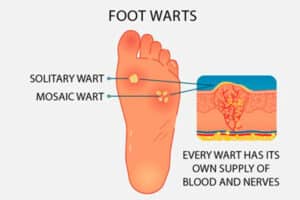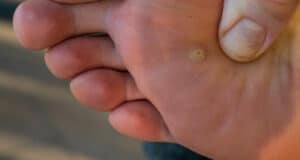
Warts are small, non-cancerous growths that occur on the skin. They are caused by a type of human papillomavirus (HPV) and can appear anywhere on the body. Warts have a rough, raised surface and can be single or multiple in number. They are classified based on their location and appearance, with common types including plantar warts (on the soles of the feet), genital warts, and flat warts. Warts are highly contagious and can be spread through direct or indirect contact with the HP virus. Treatment options vary depending on the type and severity of the wart, but may include over-the-counter creams, freezing therapy, and surgical removal.
Verruca / Plantar Warts
 Verruca, also known as plantar warts, are small, benign growths that form on the soles of the feet. They are highly contagious, spreading from person to person through contact with contaminated surfaces.
Verruca, also known as plantar warts, are small, benign growths that form on the soles of the feet. They are highly contagious, spreading from person to person through contact with contaminated surfaces.
The signs and symptoms of plantar warts include small, fleshy growths with a rough surface, often with black spots or pinpoints in the center. They can cause pain and discomfort, especially when walking or standing, and may also be accompanied by tenderness or swelling.
There are two types of plantar warts:
A solitary wart is a single wart. It frequently becomes bigger and might eventually spread, producing more satellite warts.
Mosaic warts are a collection of several little warts that are tightly spaced out in one location. Treatment for mosaic warts is more challenging than for solitary warts.
Prevalence of Verrucae / Plantar Warts
Plantar warts are common around the world, particularly in Ireland and the UK, where they are estimated to affect up to 10% of the entire population. They can occur in people of all ages but are more common in children and adolescents.
 What causes Plantar Warts?
What causes Plantar Warts?
The exact cause of plantar warts is not fully understood, but it is believed that the virus enters the body through small cuts or breaks in the skin, especially in areas that are frequently exposed to damp or contaminated surfaces, such as public showers or swimming pools.
Prevention is better than cure
To prevent plantar warts, it is important to maintain good hygiene and to avoid coming into contact with contaminated surfaces. This can include wearing shoes or sandals in public showers and changing rooms, keeping feet clean and dry, and avoiding sharing towels or other personal items with others.
In some cases, plantar warts can resolve on their own, but many people seek treatment to relieve the pain and discomfort they cause. The most common treatments include over-the-counter topical creams, freezing the warts with liquid nitrogen, and surgical removal.
At Step Right Clinic, we have had great success treating patients with plantar warts using H-Warts solution, an effective and natural treatment that works to break down and eliminate the virus that causes warts. This unique formula contains essential oils that have been proven to effectively target the virus and promote healing.
H-Warts solution is easy to apply and can be used at home or on the go, making it a convenient and affordable alternative to more invasive treatments. Simply apply a small amount of the solution to the affected area, and allow it to absorb into the skin.
If you are suffering from plantar warts and are looking for a safe, effective treatment, consider H-Warts solution. Our patients have reported excellent results, with many experiencing significant improvement after just a few applications.
In conclusion, plantar warts are a common and painful condition that can affect people of all ages. To prevent them, it is important to maintain good hygiene and avoid exposure to contaminated surfaces. If you are suffering from plantar warts, Step Right Clinic can help, with H-Warts solution offering a safe and effective alternative to traditional treatments. So, why wait? Take the first step towards pain-free feet today!
We have 2 locations Waterford & New Ross,
PLEASE SELECT it during the reservation
© 2024 Step Right. All Rights Reserved.